Sangin Kim, PhD
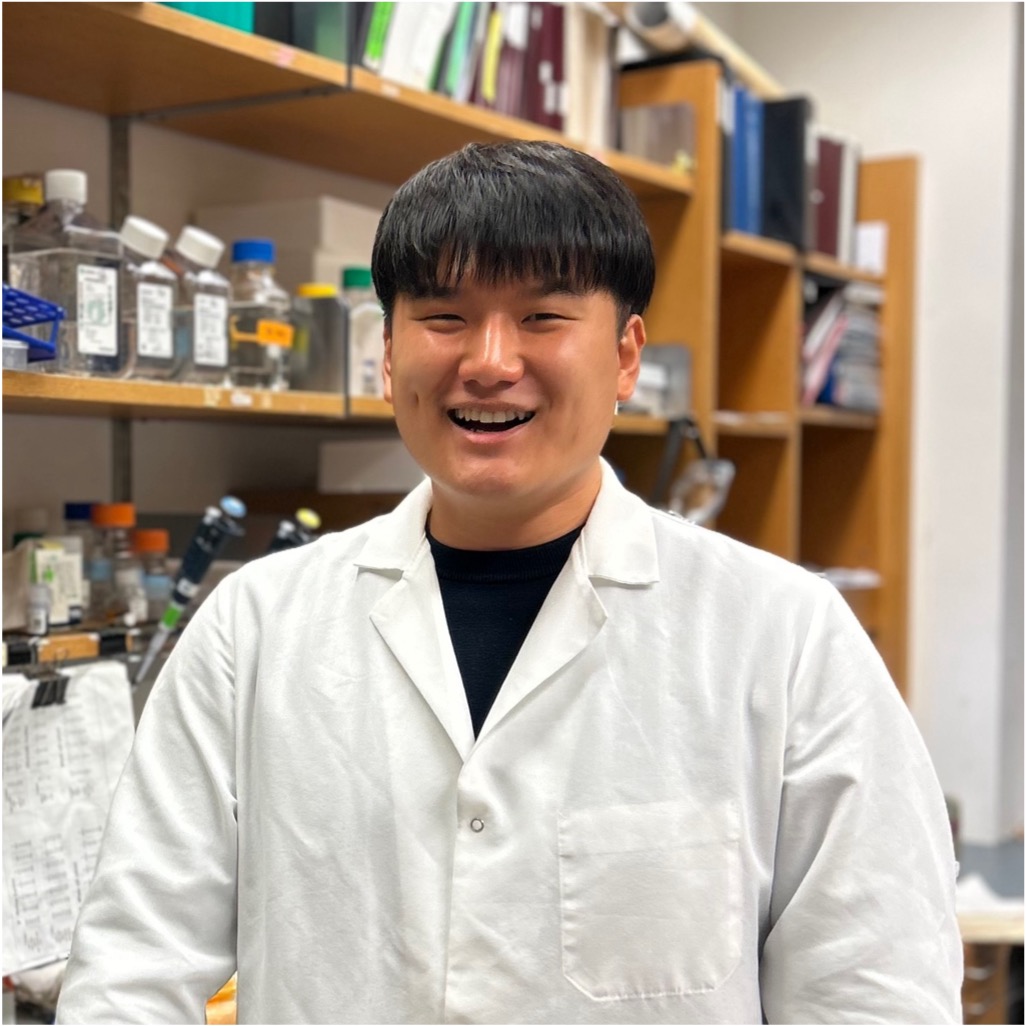
The cellular response to DNA damage is coordinated by an enzyme known as ATM kinase. Mutations in ATM are found in approximately 1% of the population and contribute to an increased risk of both hereditary and sporadic cancers, including breast cancer. Dr. Kim’s [Lallage Feazel Wall Fellow] research investigates how ATM suppresses the production of double-stranded RNAs (dsRNAs) in response to DNA damage. These dsRNAs play a critical role in tumor progression. Dr. Kim aims to identify the key molecular players involved in ATM-mediated suppression of dsRNAs and elucidate how the loss of ATM function triggers inflammatory responses through dsRNA sensing pathways. By uncovering these mechanisms, Dr. Kim aims to deepen our understanding of how ATM mutations drive cancer development and uncover novel therapeutic strategies for ATM-associated cancers. Dr. Kim received his PhD and BS from the Ulsan National Institute of Science and Technology, Ulsan.
Meghan A. Morrissey, PhD

Certain immunotherapies work by instructing macrophages, a type of innate immune cell, to attack the tumor by phagocytosing, or eating cancer cells. However, macrophages rarely eat an entire cancer cell within a solid tumor. Instead, they nibble pieces off the cancer cell, a process called trogocytosis. While phagocytosis kills the cancer cell, trogocytosis usually doesn’t – and worse, nibbling removes the markers on the cancer cell that allow the immune system to recognize it as a threat. Dr. Morrissey is studying why some cancer cells die after being nibbled while others survive, with the goal of making macrophage-activating immunotherapies more effective. Specifically, she is studying Her2-positive breast and ovarian cancers, as it has been shown that Her2 immunotherapies cause trogocytosis instead of phagocytosis. This research could enhance any immunotherapy that is designed to activate macrophage phagocytosis, improving treatment of diverse cancers like lung cancer, lymphoma, and glioblastoma.
Mark Yarmarkovich, PhD

CAR T cells, or genetically engineered immune cells, have transformed the treatment of cancer in recent years, achieving cures for many patients who previously faced terminal diagnoses. Despite the remarkable impact that CARs have had on patients and families, however, fewer than 5% of cancer patients currently benefit from these therapies. A major barrier to broader CAR applications lies in the identification of tumor-specific targets: only ~0.00000001% of the cell surface distinguishes tumor cells from healthy cells. To date, CARs have targeted molecules on the surface of tumor cells, but the majority of tumor-specific molecules reside within the cell, where they are inaccessible to conventional CARs. Dr. Yarmarkovich’s team has pioneered a new class of CAR T cells that are able to target key drivers of cancer. These CARs completely eradicate aggressive tumors in preclinical testing and are entering the clinic in 2025. Encouraged by this success, he has proposed three new strategies to comprehensively map the landscape of subtle molecular differences that distinguish tumor cells from healthy cells. He will map the “known unknowns” using cutting-edge technologies for characterizing the surface of tumor cells, as well as the “unknown unknowns” by harnessing the immune system’s intrinsic capacity for identifying foreign targets. The goal of this study is to significantly expand the landscape of actionable immunotherapy targets, paving the way for curative therapies that benefit a much larger population of cancer patients.
Kheewoong Baek, PhD
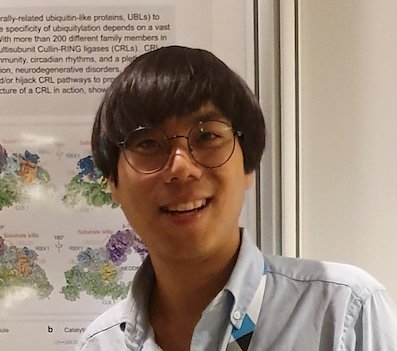
Attaching a small molecule known as ubiquitin to a protein, in a process called ubiquitylation, targets that protein for degradation. By utilizing the ubiquitylation machinery, scientists are now able to target cancer-causing proteins for degradation, a strategy that has proven effective with drugs such as Lenalidomide/Revlimid to treat multiple myeloma. One way to bring proteins in proximity to ubiquitin ligases (attachers) is with synthetic adhesion molecules, or “molecular glue.” This may provide a means of targeting proteins previously deemed undruggable, including those that lack a binding site for inhibitors. Dr. Baek [Meghan E. Raveis Fellow] aims to expand the degradable proteome by establishing a formula for the design of molecular glues to target cancer-causing proteins as a therapeutic modality. Dr. Baek received his PhD from Technical University of Munich and Max Planck Institute of Biochemistry, Munich, his MS from University of Tennessee Health Science Center, Memphis, and his BA from Rutgers University, New Brunswick.
John Devany, PhD
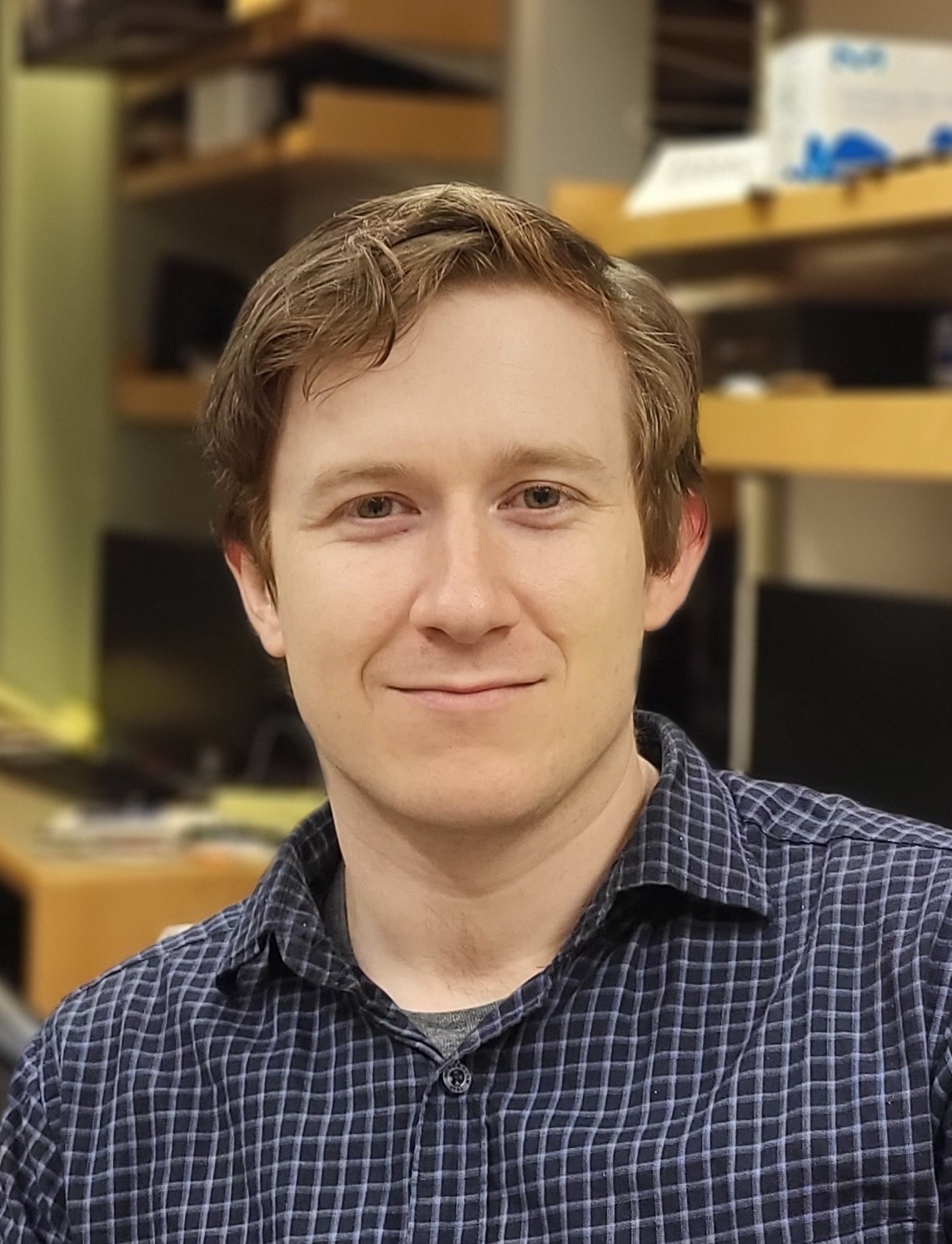
T cell therapies have led to promising results in treating blood cancers, but new approaches are required to translate these results to solid tumors. In solid tumors, T cells face unique challenges in the tumor microenvironment (TME), which limits the persistence and efficacy of adoptive T cell therapies. In T cell lymphomas (TCLs), tumor cells overcome many of the same challenges through acquired mutations. Fueled by natural selection, tumor mutations produce novel and elegant solutions to address T cell deficits in the TME. Understanding that these modifications may be superior to current bioengineering capabilities, Dr. Devany [Bakewell Foundation Fellow] plans to introduce gain-of-function mutations into therapeutic T cells to grant them the ability to survive, proliferate, and function in the TME. He will determine how each mutation restores different aspects of T cell function, allowing for the design of combinations of mutations that act synergistically. His results will aid in the development of next-generation T cell therapies to cure solid tumors. Dr. Devany received his PhD from University of Chicago, Chicago and his BS from University of California, Santa Barbara.
James C. Taggart, PhD
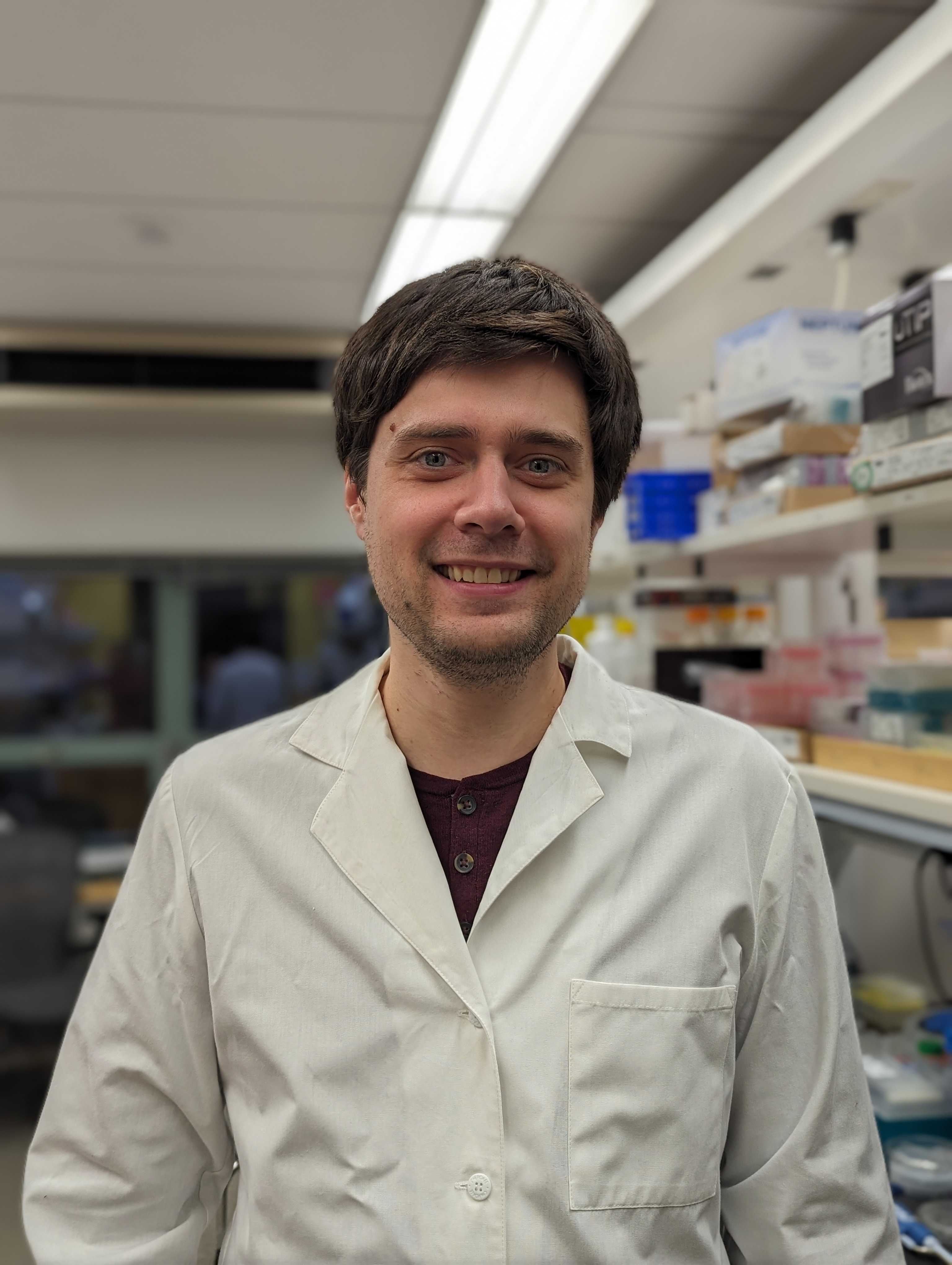
Antimicrobial resistance is a growing crisis that imperils our ability to protect patients immunocompromised by cancer treatment. Despite this, the few new antibiotics currently in clinical trials primarily use established mechanisms of action. Identification of new targets for antimicrobial drugs is thus an urgent clinical need. Recent work has shown that bacteria can tolerate substantial inhibition of many proteins thought to be essential for growth, rendering them poor drug targets. The mechanisms that cause this robustness are poorly understood. By combining cutting-edge microfluidic technologies with methods for controlled gene repression, Dr. Taggart will systematically identify mechanisms that allow bacterial cells to tolerate inhibition of genes critical for cellular growth. This work will guide the selection of targets for future antibiotic development and may reveal mechanisms by which to sensitize bacterial cells to existing drugs. Dr. Taggart received his PhD from Massachusetts Institute of Technology, Cambridge and his BS from Haverford College, Haverford.
Hasreet K. Gill, PhD
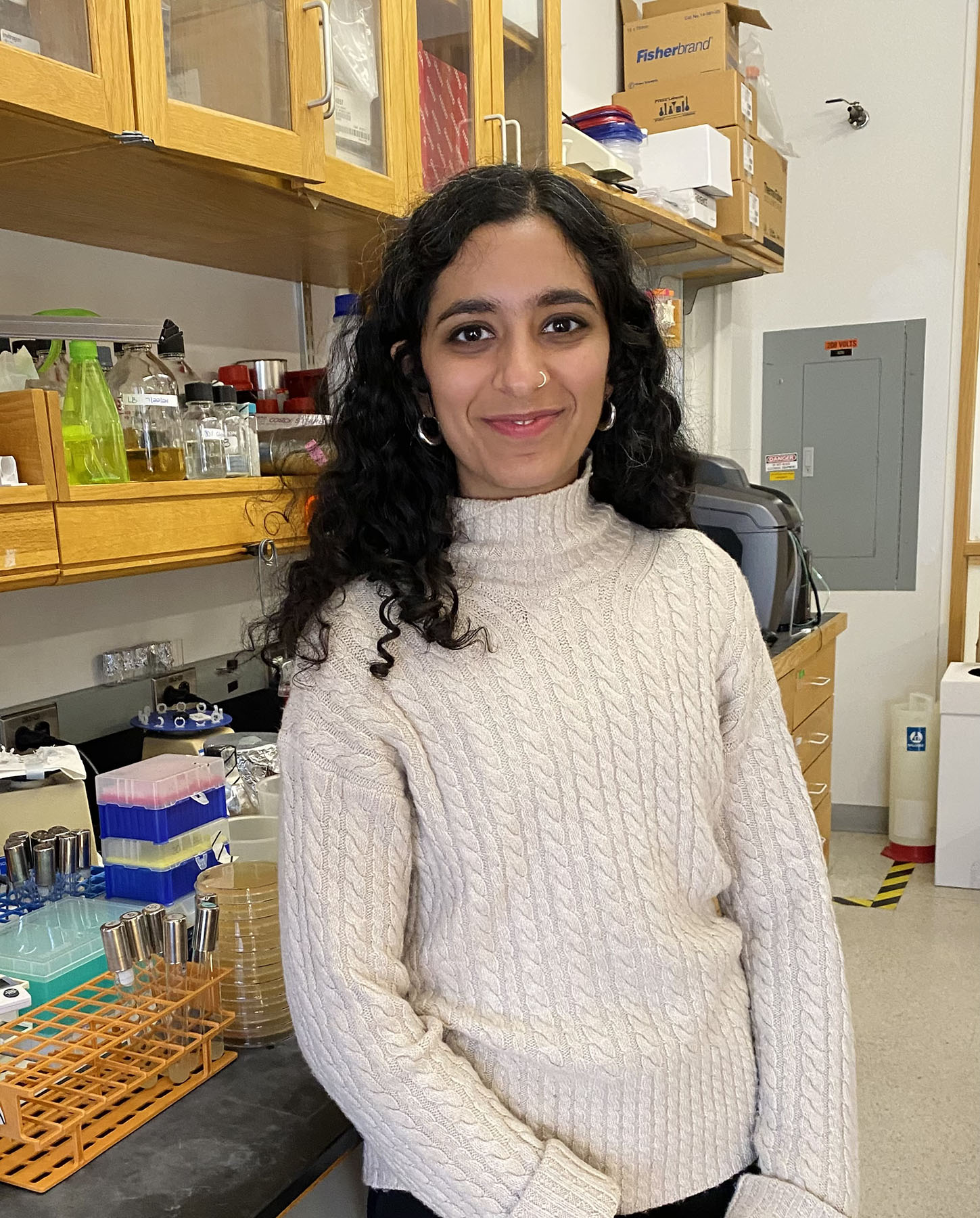
Dr. Gill [HHMI Fellow] is studying cell-cell communication via quorum sensing in developing biofilms. Biofilms are communities of bacteria that take on a three-dimensional structure and often develop striking visual features like wrinkles. Resident bacteria exploit this complexity to resist antimicrobial treatments and cause disease, particularly in healthcare settings, where biofilms pose serious threats to immunocompromised chemotherapy patients. Quorum sensing is the process by which bacteria orchestrate collective behaviors, including the assembly and dissolution of biofilm communities. Using quantitative microscopy at single-cell resolution, Dr. Gill is investigating how these signals between bacteria result in the construction of spectacular 3D biofilms at the air-liquid interface. A deeper understanding of how bacteria thrive in dynamic environments will contribute to new strategies to combat infections, which will positively impact treatments for all cancer types. Dr. Gill received her PhD from Harvard University, Cambridge and her BS from Drexel University, Philadelphia.
Dhiraj Indana, PhD

Successful immune responses against cancer require immune cells of various types to control each other’s proliferation, differentiation, and death. These interactions collectively constitute a set of intercellular signaling circuits. A fundamental challenge in cancer research is to understand the relationship between the architecture and functions of these circuits. Dr. Indana will quantitatively model and synthetically construct intercellular circuits with immune-like functions to understand how circuit architectures empower immune behaviors such as threat detection and cancer elimination while maintaining the ability to return to a non-inflammatory state. This work promises to uncover the “design principles” underlying various immune functions, providing a foundation for engineering novel immunotherapies. Dr. Dhiraj received his PhD and MS from Stanford University, Stanford and his BTech from Indian Institute of Technology, Roorkee.
Ariën Schiepers, PhD

T lymphocytes, an important component of the immune system, recognize infected or cancerous cells with great specificity, ensuring targeted elimination. These potent cells are kept in check by regulatory T cells, the guardians of the immune system. While essential for curtailing excessive inflammation and preventing autoimmunity, their immunosuppressive properties can promote the development and progression of cancer. Regulatory T cells are distinguished by the presence of a protein called Foxp3, which plays a critical role in their differentiation, function and fitness. Foxp3 deficiency results in fatal autoimmune inflammatory disease, underscoring its importance for maintaining organismal health. Despite its significance, however, the reliance of regulatory T cells on Foxp3 in disease contexts like infection and cancer remains incompletely understood. Dr. Schiepers [HHMI Fellow] will study the fate and function of regulatory T cells in these settings using mouse genetics approaches and disease models of melanoma and colorectal cancer. Dr. Schiepers received his PhD from The Rockefeller University, New York and his MS and BS from Utrecht University, Utrecht.
Antonio J. LaPorte, PhD

Sugar molecules on the surface of cells can be arranged in many different patterns, and it is the exact structure of a sugar that gives it its unique function. In sugars on the surface of cancer cells, the location of sulfate (SO4-) groups changes as the tumor grows and spreads. The study of sulfated sugars has been stymied, however, by the difficulty of synthesizing them in the laboratory. Dr. LaPorte’s research aims to remove this roadblock by developing a chemical reaction that easily constructs biologically important sugars with a sulfate group bound to them. These sulfated sugars will then be used to test how specific sulfation patterns affect their interaction with other biological proteins. The results of these experiments will lay the groundwork for new cancer treatments that use complicated sugar structures to selectively target cancer cells without harming healthy cells. Dr. LaPorte received his PhD from University of Illinois, Urbana-Champaign, Champaign and his BS from North Central College, Naperville.
